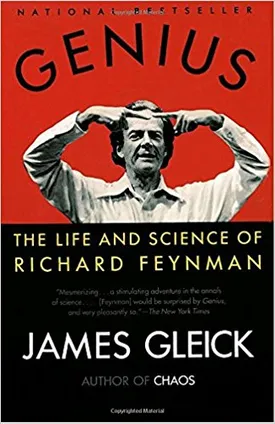Genius: The Life and Science of Richard Feynman by James Gleick
Genius: The Life and Science of Richard Feynman is a biography of one of the world’s most renowned scientists, Richard Feynman. Written by James Gleick, this book explores the life and scientific achievements of the Nobel Prize-winning physicist. The book draws on hundreds of interviews with those who knew Feynman and his writings, correspondence from the Archives of the California Institute of Technology, and personal research by the author. It is well-received for its detailed insights into the mind and character of Feynman, as well as its depth of understanding for the scientific topics it covers.
Feynman was born in 1918 and raised in Far Rockaway, New York. His parents were Jewish immigrants who gave him a scientific toy when he was three years old, setting the stage for his passion for science. As a young man, he studied theoretical physics at the Massachusetts Institute of Technology and later worked on the Manhattan Project at Los Alamos during World War II. He went on to become a professor of physics at Cornell University and later at the California Institute of Technology, where he won the Nobel Prize in Physics in 1965 for his work in quantum electrodynamics.
Throughout his career, Feynman had a reputation for being a rebellious thinker. He was famously impatient with dull or uncreative thinking and consistently challenged accepted scientific theories. He could see beyond existing models and was unafraid to think and work in ways that contradicted conventional wisdom. As a result, he won admirers and detractors alike.
Gleick provides an in-depth analysis of Feynman’s work in quantum electrodynamics, exploring the scientific methods he used, his theories, and the debates and collaborations that existed between the different scientists involved. He also chronicles Feynman’s personal life and relationships, from his childhood in Far Rockaway to his death in 1988, offering an intimate portrait of the life and times of the renowned scientist.
The book provides an understanding and appreciation for Feynman’s unique views on science as well as his life and work. It is filled with details about the science, personal reflections, and anecdotes that make it a compelling read. Gleick’s writing is clear, informative, and often humorous. The book is certainly not without criticism, however; some reviewers feel that the author should have given more weight to cultural and political influences on Feynman’s work, such as his involvement in the nuclear and space programs.
Genius: The Life and Science of Richard Feynman provides a comprehensive and entertaining look at one of the most important and influential scientists of the twentieth century. The book is sure to be valuable and enjoyable for those looking for an insightful and entertaining read about science and the life of a genius.

